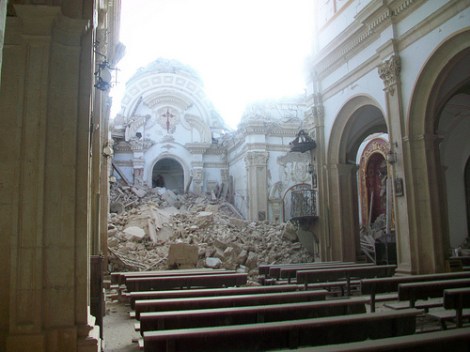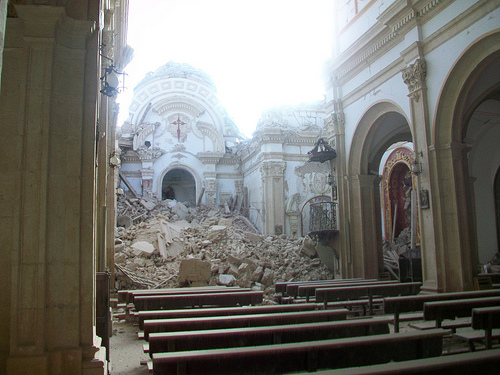
aperiagoA church damaged in the 2011 Lorca earthquake.
It’s not only injecting wastewater (well, water mixed with other chemicals, including known carcinogens) into the ground that can result in earthquakes. So can drawing too much water out.
From the Washington Post:
Farmers drilling ever deeper wells over decades to water their crops likely contributed to a deadly earthquake in southern Spain last year, a new study suggests. The findings may add to concerns about the effects of new energy extraction and waste disposal technologies.
Nine people died and nearly 300 were injured when an unusually shallow magnitude-5.1 quake hit the town of Lorca on May 11, 2011. It was the country’s worst quake in more than 50 years, causing millions of euros in damage to a region with an already fragile economy.
Using satellite images, scientists from Canada, Italy and Spain found the quake ruptured a fault running near a basin that had been weakened by 50 years of groundwater extraction in the area.
Geologists studying the earthquake note that the fault would likely have ruptured at some other point. The water extraction — and the continuously deeper wells that extraction required — served as a trigger. Earthquakes are about stress relief; fault lines are points of tension between two formations. When they slip past or over one another, an earthquake results.
New Scientist explains why this makes human drilling more dangerous.
[Jean-Philippe Avouac from California Institute of Technology in Pasadena] agrees that stress in the earth’s crust has to be released one way or another. But he says human activity — like water extraction — can cause the stress to be released quickly, rather than dissipating slowly over time.
“It’s not just that you’re advancing an earthquake that would have happened anyway. It’s that you’re creating more or larger earthquakes,” he says.
I’m starting to get the sense that we humans aren’t as good at controlling our environment as we like to think.



